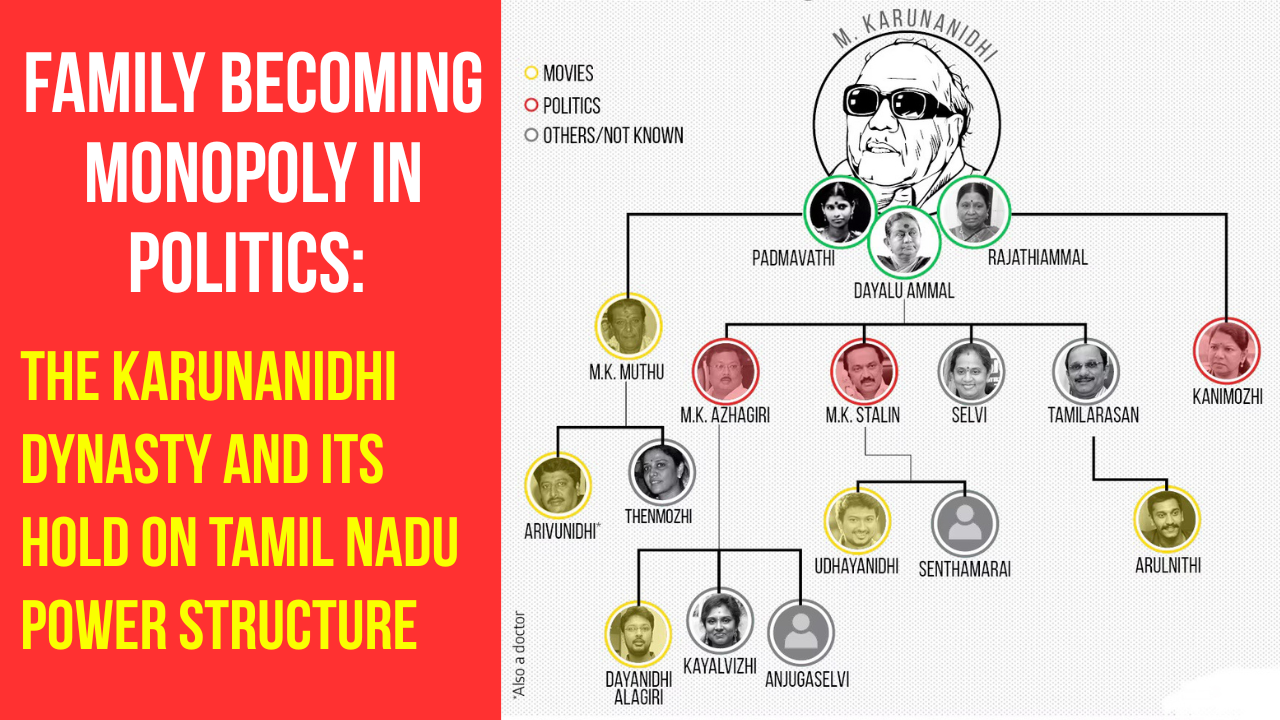Family Becoming Monopoly in Politics: The Karunanidhi Dynasty and Its Hold on Tamil Nadu Power Structure
Editor: Chandan M
Published on: July 16, 2025, 6:07 p.m.

The Dravida Munnetra Kazhagam (DMK), once a revolutionary party built on anti-caste, anti-elitist principles, is now facing growing criticism for functioning as a dynastic enterprise. The influence of M. Karunanidhi's family, which spans multiple generations and branches, dominates both the political leadership of the party and government positions in Tamil Nadu. This consolidation of power within a single family has triggered widespread concerns about political monopoly, suppression of internal democracy, and long-term impacts on merit-based politics in the state. The Karunanidhi Family Tree: Political Roles and Positions 1. M. Karunanidhi (1924–2018) Founder of the dynasty within DMK Chief Minister of Tamil Nadu five times President of DMK for 49 years (1969–2018) 2. M. K. Stalin (Son from Dayalu Ammal) Current Chief Minister of Tamil Nadu (since 2021) DMK President (since 2018) Previously held positions: Mayor of Chennai, Deputy CM, Minister for Rural Development 3. Udhayanidhi Stalin (Son of M. K. Stalin) Former film actor Elected MLA in 2021 Appointed Minister for Youth Welfare & Sports Development in 2022 Elevated to Deputy Chief Minister in 2024 Also DMK Youth Wing Secretary, seen as Stalin’s political heir 4. Kanimozhi Karunanidhi (Daughter from Rajathi Ammal) Current Rajya Sabha MP from Tamil Nadu Deputy General Secretary of DMK Previously served as MP from Thoothukudi Active in women’s issues, parliamentary debates, and party organization 5. M. K. Alagiri (Son from Dayalu Ammal) Former Union Minister of Chemicals and Fertilizers (2009–2013) Ex-DMK South Zone Organiser Expelled from DMK in 2014 after a power struggle with Stalin Political career largely inactive since then 6. Tamilarasu (Son from Dayalu Ammal) Not directly in politics Manages Kalaignar TV, a DMK-aligned media house, strengthening family influence in public narrative 7. M. K. Muthu (Son from Padmavathi Ammal) Actor and singer Brief, unsuccessful political stint Later estranged from Karunanidhi and sidelined from political life How This Affects Tamil Nadu Society 1. Weakening of Internal Democracy Top posts in DMK are perceived as reserved for family members Party workers and lower-tier leaders rarely rise to key leadership positions regardless of merit or seniority Decision-making is heavily centralized within the family 2. Suppression of Merit-Based Politics Capable leaders outside the Karunanidhi lineage are often overlooked Potentially discourages youth and professionals from entering politics unless they have familial or celebrity backing 3. Voter Disillusionment Voters who once supported DMK for its social justice agenda are increasingly cynical The party’s original ideology—fighting inherited privilege—is now questioned 4. Media Influence and Narrative Control Through Kalaignar TV and other media arms, the family is able to amplify its narrative and suppress criticism This skews public discourse and makes internal dissent difficult to surface 5. Political Stability with Ideological Drift While DMK under Stalin remains electorally successful, critics argue the party has shifted from movement to dynasty Core Dravidian principles—equality, anti-caste, and rationalism—are no longer reflected in leadership structure Conclusion The Karunanidhi family’s dominance over the DMK has grown from a legacy to what many view as a hereditary political monopoly. With M. K. Stalin consolidating power and grooming Udhayanidhi as his successor, DMK appears set to remain a family-run entity for the foreseeable future. While the party continues to win elections and deliver welfare, the underlying lack of internal democratic accountability and meritocracy raises serious questions about the future of political ethics, inclusivity, and leadership in Tamil Nadu.